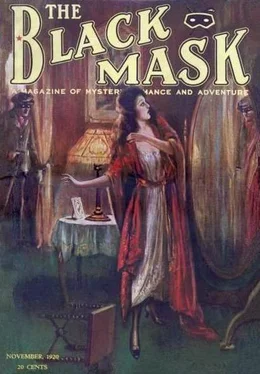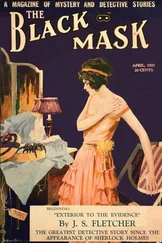Hamilton Craigie - The Black Mask Magazine (Vol. 2, No. 2 — November 1920)
Здесь есть возможность читать онлайн «Hamilton Craigie - The Black Mask Magazine (Vol. 2, No. 2 — November 1920)» весь текст электронной книги совершенно бесплатно (целиком полную версию без сокращений). В некоторых случаях можно слушать аудио, скачать через торрент в формате fb2 и присутствует краткое содержание. Город: New York, Год выпуска: 1920, Издательство: Pro-distributors Publishing Company, Жанр: Классический детектив, на английском языке. Описание произведения, (предисловие) а так же отзывы посетителей доступны на портале библиотеки ЛибКат.
- Название:The Black Mask Magazine (Vol. 2, No. 2 — November 1920)
- Автор:
- Издательство:Pro-distributors Publishing Company
- Жанр:
- Год:1920
- Город:New York
- ISBN:нет данных
- Рейтинг книги:5 / 5. Голосов: 1
-
Избранное:Добавить в избранное
- Отзывы:
-
Ваша оценка:
- 100
- 1
- 2
- 3
- 4
- 5
The Black Mask Magazine (Vol. 2, No. 2 — November 1920): краткое содержание, описание и аннотация
Предлагаем к чтению аннотацию, описание, краткое содержание или предисловие (зависит от того, что написал сам автор книги «The Black Mask Magazine (Vol. 2, No. 2 — November 1920)»). Если вы не нашли необходимую информацию о книге — напишите в комментариях, мы постараемся отыскать её.
The Black Mask Magazine (Vol. 2, No. 2 — November 1920) — читать онлайн бесплатно полную книгу (весь текст) целиком
Ниже представлен текст книги, разбитый по страницам. Система сохранения места последней прочитанной страницы, позволяет с удобством читать онлайн бесплатно книгу «The Black Mask Magazine (Vol. 2, No. 2 — November 1920)», без необходимости каждый раз заново искать на чём Вы остановились. Поставьте закладку, и сможете в любой момент перейти на страницу, на которой закончили чтение.
Интервал:
Закладка:
Not caring now whether or not he were seen, he walked boldly down the hall and waited for the elevator, which a moment later bore him to the main corridor below.
Now his hurry and excitement were over. What he had set out to do he had accomplished. Leisurely he turned his steps homeward. At a corner drug store he stopped, and spent a few moments telephoning. A half hour later he was in bed sleeping as quietly as a tired child.
IV
The next morning at eleven o’clock five people were gathered in Police Commissioner Oglethorpe’s office at headquarters awaiting the coming of Song Kee. The Commissioner himself sat at his desk going through his morning’s mail. Detective Sergeant Delaney stood beside the window looking down into Centre Street and talked in subdued whispers to a representative from the District Attorney’s office. In a far corner sat Sylvia Granger beside her fiancé, Grover. They did not talk, but just sat there hand in hand waiting expectantly.
At five minutes after the hour, Song Kee was ushered into the room. He was immaculately garbed in morning coat, striped trousers and patent leather boots. In one hand he carried a silk hat in the latest mode, in the other a cane. When Delaney saw him he gasped. In dress and manner he was so different from the little Chinaman who used to lounge in the backroom of the - Branch Detective Bureau, tolerated for his good nature and his generosity in the matter of fairly good cigars. His surprise was changed to awe when he saw the Commissioner rise and greet the Chinaman with the respect one shows to an equal.
Song Kee bowed low to Miss Granger and the Commissioner. He greeted Delaney with a genial wave of the hand. Then he hung his hat on the Commissioner’s rack and leaned his cane carefully against it. These details attended to he seated himself comfortably in the centre of the room.
“I must apologize for keeping you all waiting,” he said, “but my taxi was delayed—a little argument between my driver and one of your excellent traffic policemen. But now that I am here we can proceed at once with the matter in hand.
“You are all here,” he continued, “at my request. Be assured, I would not have sent for you had the affair not been urgent. I have done three things — proved the validity of certain statements I once made to you, Mr. Oglethorpe; given Miss Granger the help she asked for, and taken advantage of Mr. Delaney’s offer to ‘go to it’ if I thought I could discover anything he had overlooked in the Grenville murder case.”
A half suppressed snort from Delaney interrupted him. He turned.
“Yes, Mr. Delaney,” he said gently, “I have found several little things which you overlooked—one of which is the real murderer of Irene Grenville.”
Sylvia Granger started from her chair.
“Then— then—” she began, but words failed her and she sank back beside Grover, her eyes fixed doubtfully upon the Chinaman.
“Miss Granger,” Song Kee said smiling across the room, “Mr. Grover is as innocent as you or I of the Grenville woman’s death. In a few moments I think I shall be able to convince these gentlemen of that fact.”
“Well, you’ll have to go some, young man,” the rather officious Assistant District Attorney put in. “The evidence we have—”
“Would be enough to convict the Commissioner himself,” Song Kee laughed, “if wrongly applied.” He paused.
“I can see that you, like Mr. Delaney, have been taken in by facts. And as I told Mr. Oglethorpe once when we discussed these matters, facts are not always sign-posts to the truth. The clever criminal will conceal his crime beneath misleading facts, rather than lies. In this case the criminal chose to create facts pointing to the guilt of another. And to use a phrase of your delightful slang, ‘you fell for it’.”
“Aw, fer the love of Mike, get on.” This from Delaney, sotto voce .
Song Kee overheard him. “Very well, Mr. Delaney, I will ‘get on’.” He turned to the Commissioner.
“Mr. Oglethorpe, you will recall that my complaint about the Occidental detective concerned his inability to believe in the unbelievable. That applied in this case. Mr. Delaney here, who, by the way, is an efficient man, was convinced beyond the shadow of a doubt that Mr. Grover was guilty of the murder of Irene Grenville. He was taken in by the facts presented—the ‘almost’ eye-witness to the act—the finger-prints on the dagger. When I suggested to him that perhaps another might have killed the dancing woman, he laughed at me. The idea was beyond belief and as such he would not believe in it.”
Delaney clenched his unlighted cigar more firmly between his teeth and muttered, “Yes, and I’d like to see the guy that could.”
“Now, I’ll admit,” Song Kee continued, paying no attention to the interruption, “that Mr. Delaney did not have the incentive that I had to believe in the unbelievable. He had not had the pleasure of meeting Miss Granger nor had he drawn inspiration from her faith in her fiancé’s innocence. So—
“But to go on. I started to work from the point of view that the accused man was innocent. Therefore someone else must have committed the crime. But who? To find that out was my task. And at the outset I was very much at sea.
“I went to see my friend, Mr. Delaney, But he could do little to help me. His opinion, you see, was—well, prejudiced. However, through his kindness, I found out the names and all there was to know about the occupants of the rooms on the floor where the dancing woman had lived. Then, this information was of little use. One and all they were beyond suspicion. Then Mr. Delaney brought me down here and showed me the fatal dagger.
“Here was something interesting, and, it seemed to me, important could I but see it. It was a queer knife—very long with a straight handle running into a needle shaped blade. And there was something else peculiar about it. The top of the handle was carved with little notches and they were not in keeping with the carving on the rest of the handle. Also they were newly cut. Why? I could not answer—then.”
Song Kee paused. His audience was silent, tensely, eagerly waiting for him to continue.
“My next clue, I found iii the files of one of your daily papers.” he went on. “I knew of no other place to seek the identity of someone who might desire Miss Grenville’s death. But I reasoned that in some column of stage and Broadway gossip I might find something to put me on the track. I did. It was only a tiny paragraph, but it gave the reason why someone—someone I knew of — might kill the dancing woman. It merely related the return to his own country of a young foreigner whom she had ruined — in honor as well as in pocketbook. This young foreigner came of a family that holds its honor very dear. And by a strange coincidence, the young man’s brother had an apartment on the same floor with the woman who had dragged in the mud the honor of his family.”
“Say, you don’t mean the dago count, Angellotti?” Delaney shouted.
Song Kee held up his hand.
“Patience,” he said; “we’ll come to that later.”
“In China,” he resumed, “we have a saying to the effect that truth grows out of thought and concentration. I applied it. In my rooms I gave myself over to meditation. I had found someone who might have desired the death of the dancing woman. If I could discover a way in which he could have killed her, I might be making progress. And after a little, I did discover a way. From out of the realm of my subconscious mind there flashed an idea. What if the Grenville woman had not been stabbed at all — but shot? What if the instrument were not a dagger—but an arrow? Then I remembered that the people from whom the foreigner was sprung had been the world’s greatest archers, since the tenth century. Also I remembered the freshly cut notches on the handle of the knife—notches, which might be used to catch in the string of a bow.”
Читать дальшеИнтервал:
Закладка:
Похожие книги на «The Black Mask Magazine (Vol. 2, No. 2 — November 1920)»
Представляем Вашему вниманию похожие книги на «The Black Mask Magazine (Vol. 2, No. 2 — November 1920)» списком для выбора. Мы отобрали схожую по названию и смыслу литературу в надежде предоставить читателям больше вариантов отыскать новые, интересные, ещё непрочитанные произведения.
Обсуждение, отзывы о книге «The Black Mask Magazine (Vol. 2, No. 2 — November 1920)» и просто собственные мнения читателей. Оставьте ваши комментарии, напишите, что Вы думаете о произведении, его смысле или главных героях. Укажите что конкретно понравилось, а что нет, и почему Вы так считаете.












